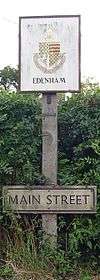Edenham
| Edenham | |
 Remains of Saxon cross in the churchyard |
|
 Edenham |
|
| Population | 291 (2011) |
|---|---|
| OS grid reference | TF061218 |
| – London | 90 mi (140 km) S |
| Civil parish | Edenham Grimsthorpe Elsthorpe & Scottlethorpe[1] |
| District | South Kesteven |
| Shire county | Lincolnshire |
| Region | East Midlands |
| Country | England |
| Sovereign state | United Kingdom |
| Post town | BOURNE |
| Postcode district | PE10 |
| Dialling code | 01778 |
| Police | Lincolnshire |
| Fire | Lincolnshire |
| Ambulance | East Midlands |
| EU Parliament | East Midlands |
| UK Parliament | Grantham and Stamford |
|
|
Coordinates: 52°47′02″N 0°25′40″W / 52.7840°N 0.4278°W
Edenham is a village in the South Kesteven district of Lincolnshire, England. It is approximately 3 miles (5 km) north-west of Bourne, and on the A151 road. The village is part of the civil parish of Edenham Grimsthorpe Elsthorpe & Scottlethorpe.[1] The population of the civil parish at the 2011 census was 291.[2]
History
The Edenham name derives from the Anglo Saxon ham, meaning "homestead". The rest of the name probably derives from dene, a "vale in woodland" and ea, "river", though "Eada's homestead" and "Eada's hemmed-in-land" have also been suggested.[3] The river East Glen which flows through it is sometimes called the "Eden" by a process of back-formation from the name of the village.
Edenham appears in the Domesday Book as having 32 villagers, 4 smallholders, 24 freemen, 5 lord's plough teams, and 9 men's plough teams, with 400 acres (1.6 km2) of woodland and 29 acres of meadow.[4]
The parish was the site of the Cistercian abbey of Vaudey, founded in 1147 by William, Earl of Albemarle. It was dissolved during the 1536 Suppression.[5]
Documents of 1307 mention the existence in Edenham of "a hospital".[6]
Since 1516 parish land and villages have been owned by the de Eresby family of Grimsthorpe Castle. This major ancestral seat 2 miles (3.2 km) to the north-west of the village influenced Edenham's estate village character. The de Eresby baronetcy has continued in an unbroken line since 1313, and heads of the family have been Earls and Dukes of Ancaster and the Earl of Lindsey.
The 19th-century Baron Willoughby de Eresby built the Edenham and Little Bytham Railway which connected the village to the East Coast Main Line at Little Bytham.[7] Apart from crossing a road in near Little Bytham station, it ran exclusively on his estate.
The Australian poet and novelist Frederic Manning stayed at the vicarage after he arrived in the country in 1903. He returned there after the First World War and began writing The Middle Parts of Fortune (republished in an expurgated version under the title Her Privates We), a novel which he completed in the neighbouring parish, Bourne.
Community

The Grade I listed[8] church retains some Anglo-Saxon fabric from the earlier building. The Saxon church was dedicated to the 'Holy Cross', but the dedication is now to St Michael, or St Michael and all Angels. It has an Angel Roof, the beams supported on the back of carved and painted angels.[8] Family monuments were moved from St Matthew's church in Normanton[8] when that church was affected by the construction of Rutland Water.
The ecclesiastical parish is Edenham. The church, dedicated to St Michael and all Angels, is part of the Edenham with Witham On The Hill Group of the Beltisloe Deanery of the Diocese of Lincoln. The 2013 incumbent is Rev Canon Andrew Hawes.[9]
The vicarage, unlike other vicarages and rectories in rural parishes, has never been sold to a private buyer. It remains the spiritual centre of three parishes and eight small villages, and is run by the Diocese of Lincoln as a retreat for contemplation and prayer.[10]
A cedar tree overhangs the road from the churchyard, and nearby are the remains of a Saxon cross, a Grade II listed building[11] and Scheduled Monument.[12]
The village Church of England primary school, also a Grade II listed building,[13] has a roll of just over one hundred pupils.[14]
Apart from agricultural employers, businesses in the village include The Five Bells public house, a coal merchant, and a post office.
References
- 1 2 "Parish council details".
- ↑ "Civil Parish population 2011". Neighbourhood Statistics. Office for National Statistics. Retrieved 16 May 2016.
- ↑ "Notes about the place name". WebCite
- ↑ "Modern map-based Domesday extracts". Retrieved 15 February 2011.
- ↑ Cox, J. Charles (1916) Lincolnshire p. 120; Methuen & Co. Ltd
- ↑ Historic England. "Hospital (1345164)". PastScape. Retrieved 4 July 2010.
- ↑ Pearson, R.E & Ruddock, J.G. Lord Willoughby's Railway the Edenham Branch (1986) ISBN 0-9511656-0-7
- 1 2 3 Historic England. "Church of St. Michael and All Angels (Grade I) (1146587)". National Heritage List for England. Retrieved 21 July 2016.
- ↑ "Edenham P C C"., Diocese of Lincoln
- ↑ "Web site for Edenham Regional House (vicarage)".
- ↑ Historic England. "Churchyard cross 5 metres south west of Church of St. Michael (Grade II) (1146650)". National Heritage List for England. Retrieved 21 July 2016.
- ↑ Historic England. "Churchyard cross, St Michael's churchyard (1009202)". National Heritage List for England. Retrieved 21 July 2016.
- ↑ Historic England. "Primary School (Grade II) (1062832)". National Heritage List for England. Retrieved 25 July 2016.
- ↑ "School Web Site".
External links
 Media related to Edenham at Wikimedia Commons
Media related to Edenham at Wikimedia Commons- "Welcome to St Michael's & All Angels, Edenham", forwardinfaithlincs.org.uk. Retrieved 26 July 2011
- "Edenham. Church: St Michael", robschurches.moonfruit.com. Retrieved 26 July 2011
- "St Michael, Edenham, Lincolnshire", The Corpus of Romanesque Sculpture in Britain and Ireland. Retrieved 26 July 2011
- "The Parliamentary Gazetteer’s Summary of Edenham, 1843.", boar.org.uk. Retrieved 26 July 2011
- "Edenham", homepages.which.net. Retrieved 26 July 2011